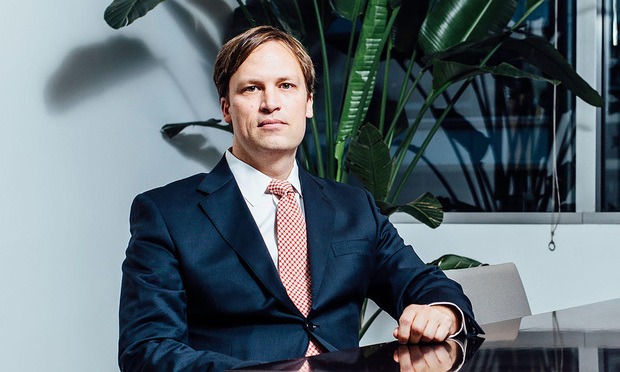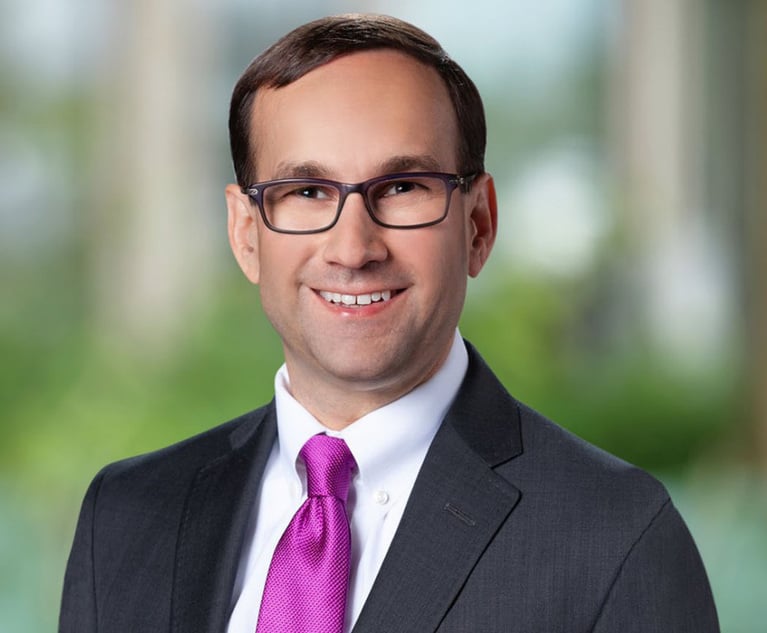Meet Jesse Gary of Century Aluminum, the GC Standing Up for Trump's Tariffs
Gary discusses the global concerns that he said threatened his company and spurred him to step out of the legal department and into the trade war fray.
August 20, 2018 at 05:51 PM
6 minute read
 Jesse Gary, Century Aluminum Co.'s general counsel. Photo: 2016 Guerrero, LLC/Caleb Fox
Jesse Gary, Century Aluminum Co.'s general counsel. Photo: 2016 Guerrero, LLC/Caleb Fox
Jesse Gary, general counsel for Chicago-based Century Aluminum Co., has risen to national prominence as the poster GC for President Donald Trump's divisive tariffs.
Earlier this year, Gary was in the room with Trump when the president signed an order to tack tariffs of 10 and 25 percent on aluminum and steel imports, respectively. His presence in that room was noteworthy, in no small part because many other GCs in the industry are pro-free trade and oppose Trump's tariffs.
Century is among the largest aluminum producers in the United States and has two plants in Kentucky, where it plans to restart some stalled production lines and hire hundreds of workers, and one in South Carolina. It also operates a smelter in Iceland. Century's aluminum is used in the aerospace, automotive and energy industries.
Corporate Counsel spoke with Gary on Monday about how he juggles his roles as a GC, businessman and lobbyist while dealing with the ever-increasing demands facing the top lawyer for a company with operations around the world. The conversation has been edited for clarity and length.
Corporate Counsel: You joined Century Aluminum back in 2010 from Wachtell, Lipton, Rosen & Katz as an associate GC, before being promoted to the top legal role. What's changed at Century over that time?
Jesse Gary: I think with every passing year the legal department has become more and more integrated into the business as we deal with more and more business types of issues, whether that be regulatory changes or commercial situations or trade changes.
When did you first realize that you needed to be more involved in geopolitics and how steep was the learning curve?
For probably the past two decades we've seen China become a bigger and bigger competitor. But the moment that it really hit was in the fall of 2015, when in our industry the price of aluminum fell by about 40 percent. And all the remaining U.S.-based producers, both ourselves and our two remaining competitors, announced that we were shutting down all of our U.S. production of aluminum. We sat there looking at that disaster and said, we need to do something about this. It's been a steep learning curve for the last three years now to try to find a solution.
You've taken a very hands-on approach to lobbying as a GC. What advice can you give to other GCs who want to get more involved in that realm?
When you're looking for ways to advocate for your business it's always best to start local and find the areas where your business is impacting the local community and use the people you're trying to help to advocate both for themselves and for your business. And then I think on a broader scale, it always pays to be very specific in what you're looking for and to try to be flexible and work with what's out there rather than first coming up with a solution and trying to be single-minded in your approach.
Was it difficult to establish those government connections?
All credit really goes to the people on the ground where our operating businesses are located and the hard work they've done over the years in establishing the relationships they have. I think that really what I'd advise people to do is look to the operating businesses. They have a tremendous impact on the communities they're in and the communities want to support them.
You were with President Donald Trump when he vowed to tax aluminum imports at 10 percent and steel imports at 25 percent. I understand that many of your competitors are not advocates for these tariffs.
Yeah, well a lot of our competitors are not U.S. producers and we're the largest U.S. producer of aluminum. The tariffs were put in place to protect and encourage expansion of U.S production to protect our national security. A lot of our competitors are foreign producers and produce overseas and have different views of the tariffs.
Were you at all hesitant to step out of the legal department and into the political spotlight?
No, not at all. I think, as lawyers, all of our roles are to do the best things for our business and this was a big area in our business that had been so impacted by these global trends and unfair trade policies being enacted in China and India and the Middle East and elsewhere. We really had no choice. I was glad to step out and take this on. And I've been very proud of the success our team has made in moving forward.
What about feedback from others in the commodities trade? Have you heard anything from them in reaction to your stance on tariffs?
This has obviously been controversial. People have different views on these policies. I think a lot of people sort of stand by and consider themselves free traders, and of course, I think we do too. But the key difference is we need to have free and fair trade. What we've seen for years is the U.S had almost no tariffs where the other major producing nations had tariffs. And so the U.S was the bleeding edge of having to shut down production. I do hear from colleagues and others who say that they're free traders. You have to sit down and talk it through with them and they usually quickly see your point of view, that something had to be done in the U.S.
So in addition to being the company's top lawyer, you also have to be a lobbyist and businessman with a deep knowledge of trade laws. What are the challenges you face in balancing all of these different roles?
They can pull you in a lot of different directions. The key is to have a good team working with you. In some cases that's the lawyers that work under you. In some cases it's the government relations folks who work under you. And in some cases it's your normal business colleagues. I think the key is to empower those people who work for you, give them the opportunities to succeed and usually they surprise you and do a great job. As our roles become broader, we often have broader responsibilities and as that happens we have to rely more and more on hiring the best people that work with us.
This content has been archived. It is available through our partners, LexisNexis® and Bloomberg Law.
To view this content, please continue to their sites.
Not a Lexis Subscriber?
Subscribe Now
Not a Bloomberg Law Subscriber?
Subscribe Now
NOT FOR REPRINT
© 2025 ALM Global, LLC, All Rights Reserved. Request academic re-use from www.copyright.com. All other uses, submit a request to [email protected]. For more information visit Asset & Logo Licensing.
You Might Like
View All
From Reluctant Lawyer to Legal Trailblazer: Agiloft's GC on Redefining In-House Counsel With Innovation and Tech
7 minute read
People and Purpose: AbbVie's GC on Leading With Impact and Inspiring Change
7 minute read
From Olympic Aspirations to Legal Innovation: Tom Dunlop's Journey to Founding Summize
8 minute read
'Am I Spending Time in the Right Place?' SPX Technologies CLO Cherée Johnson on Living and Leading With Intent
9 minute readTrending Stories
- 1States Accuse Trump of Thwarting Court's Funding Restoration Order
- 2Microsoft Becomes Latest Tech Company to Face Claims of Stealing Marketing Commissions From Influencers
- 3Coral Gables Attorney Busted for Stalking Lawyer
- 4Trump's DOJ Delays Releasing Jan. 6 FBI Agents List Under Consent Order
- 5Securities Report Says That 2024 Settlements Passed a Total of $5.2B
Who Got The Work
J. Brugh Lower of Gibbons has entered an appearance for industrial equipment supplier Devco Corporation in a pending trademark infringement lawsuit. The suit, accusing the defendant of selling knock-off Graco products, was filed Dec. 18 in New Jersey District Court by Rivkin Radler on behalf of Graco Inc. and Graco Minnesota. The case, assigned to U.S. District Judge Zahid N. Quraishi, is 3:24-cv-11294, Graco Inc. et al v. Devco Corporation.
Who Got The Work
Rebecca Maller-Stein and Kent A. Yalowitz of Arnold & Porter Kaye Scholer have entered their appearances for Hanaco Venture Capital and its executives, Lior Prosor and David Frankel, in a pending securities lawsuit. The action, filed on Dec. 24 in New York Southern District Court by Zell, Aron & Co. on behalf of Goldeneye Advisors, accuses the defendants of negligently and fraudulently managing the plaintiff's $1 million investment. The case, assigned to U.S. District Judge Vernon S. Broderick, is 1:24-cv-09918, Goldeneye Advisors, LLC v. Hanaco Venture Capital, Ltd. et al.
Who Got The Work
Attorneys from A&O Shearman has stepped in as defense counsel for Toronto-Dominion Bank and other defendants in a pending securities class action. The suit, filed Dec. 11 in New York Southern District Court by Bleichmar Fonti & Auld, accuses the defendants of concealing the bank's 'pervasive' deficiencies in regards to its compliance with the Bank Secrecy Act and the quality of its anti-money laundering controls. The case, assigned to U.S. District Judge Arun Subramanian, is 1:24-cv-09445, Gonzalez v. The Toronto-Dominion Bank et al.
Who Got The Work
Crown Castle International, a Pennsylvania company providing shared communications infrastructure, has turned to Luke D. Wolf of Gordon Rees Scully Mansukhani to fend off a pending breach-of-contract lawsuit. The court action, filed Nov. 25 in Michigan Eastern District Court by Hooper Hathaway PC on behalf of The Town Residences LLC, accuses Crown Castle of failing to transfer approximately $30,000 in utility payments from T-Mobile in breach of a roof-top lease and assignment agreement. The case, assigned to U.S. District Judge Susan K. Declercq, is 2:24-cv-13131, The Town Residences LLC v. T-Mobile US, Inc. et al.
Who Got The Work
Wilfred P. Coronato and Daniel M. Schwartz of McCarter & English have stepped in as defense counsel to Electrolux Home Products Inc. in a pending product liability lawsuit. The court action, filed Nov. 26 in New York Eastern District Court by Poulos Lopiccolo PC and Nagel Rice LLP on behalf of David Stern, alleges that the defendant's refrigerators’ drawers and shelving repeatedly break and fall apart within months after purchase. The case, assigned to U.S. District Judge Joan M. Azrack, is 2:24-cv-08204, Stern v. Electrolux Home Products, Inc.
Featured Firms
Law Offices of Gary Martin Hays & Associates, P.C.
(470) 294-1674
Law Offices of Mark E. Salomone
(857) 444-6468
Smith & Hassler
(713) 739-1250






